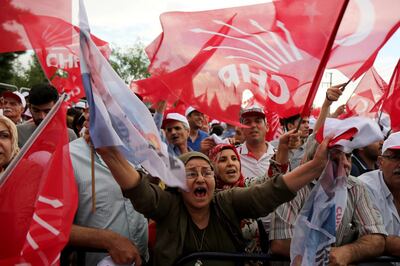The main challenger to incumbent President Recep Tayyip Erdogan is on a major charm offensive to win the crucial Kurdish vote in eastern Turkey head of elections.
At a rally in Diyarbakir on Monday, Muharrem Ince promised welcoming crowds of thousands that he would resolve the Kurdish issue and introduce the teaching of Kurdish in schools.
To have any chance of an upset victory in the June 24 election, the Republican People's Party (CHP) candidate needs the support of the Kurds, which would have once been unthinkable for a Turkish nationalist party. But the huge turn-out in Turkey's largest Kurdish-majority city suggests Mr Ince could be succeeding.
“No CHP leader before could have such a huge meeting in Diyarbakir,” Hisyar Ozsoy, a vice-chair of the Kurdish-focused Peoples’ Democratic Party (HDP), said. “We get around 80 per cent of the local vote there.”
The CHP has long been associated in Kurdish minds with undermining their aspirations in a bid to enforce a pan-Turkish identity.
However, with the election looming, opposition supporters are looking to the best-placed candidate to take on Mr Erdogan in a runoff vote, if – as most polls indicate – he fails to secure more than 50 per cent in the first round.

Kurds make up around a fifth of Turkey’s 80 million population and to have a chance of winning, a second-round candidate would need their backing. “The Kurds have the most politically informed minds in Turkey and Ince must be able to get a big proportion of HDP voters,” said Ozer Sencar, head of polling firm Metropoll.
On Wednesday, HDP co-leader Sezai Temelli called for an opposition pact should the vote go to a run-off on July 8. “It’s either Erdogan or democracy,” he told independent news site T24.
As the closest challenger to Mr Erdogan, Mr Ince, a former physics teacher, is the most likely to face him.
“If Erdogan cannot win in the first round, most likely Muharrem Ince will be the second candidate because he’s scored well in the polls,” Mr Ozsoy said. “We will be discussing what to do if the second round comes. Ince is trying to communicate with the Kurdish population with symbolic demonstrations.”
Aside from pledges given in Diyarbakir, these demonstrations include visiting the HDP presidential candidate Selahattin Demirtas in prison, calling for his release and stressing his earlier opposition to the removal of immunity for parliamentary deputies – a law that was backed by most CHP deputies and saw Demirtas and other HDP lawmakers jailed.
______________
Read more:
Expat Turks begin casting votes for June 24 elections
From prison cell, Erdogan rival questions election legitimacy
Erdogan's election travels expose challenge at home
______________
Mr Ince has also committed himself to represent all Turkish citizens, symbolically removing his party badge at the start of the campaign.
“For the first time, Turkey has a two-round election and it’s interesting to see how it will play out,” Selim Koru, an analyst at the Economic Policy Research Foundation of Turkey, said.
“Ince is the candidate of the largest opposition party and is trying to position himself as the strongest candidate of the ‘Not Erdogan’ camp. He’s trying to appeal to two poles – the leftist/HDP pole and the conservative nationalists. He needs to combine these to be successful.”
The opposition is also hoping the HDP will pass the 10 per cent threshold in the simultaneous parliamentary election. This would reduce the chances of Mr Erdogan’s Justice and Development Party (AKP) and its Nationalist Action Party (MHP) ally achieving a majority.
If the HDP does not pass the threshold, most of its votes will be redistributed to the AKP, which is the second-best supported party in the southeast, giving it around more 80 seats.

This division among Kurdish voters between the HDP and the AKP is often portrayed as a split between secular leftists and pious conservatives.
This is an oversimplification. “Many people who are supporting the AKP are just voting for the state – it’s about resources, business contracts and clientism,” Mr Ozsoy said. “In the past the AKP had some ideological ground and support but now they don’t. People don’t see the AKP as an Islamist party but a nationalist one because of the nationalist stance and the alliance with the MHP.”
As well as the electoral alliance, the AKP has also launched offensives against Kurdish militants in Iraq and Syria, shelled Kurdish cities in Turkey as it battled the Kurdistan Workers’ Party (PKK) and arrested HDP officials, Kurdish mayors and journalists.
“The AKP in the region is losing votes to the HDP because of its aggressive anti-Kurdish stance and people are quite motivated to teach him a lesson,” Mr Ozsoy added.
Whether this lesson is enough to benefit a former teacher will decide Turkey’s next leader.

